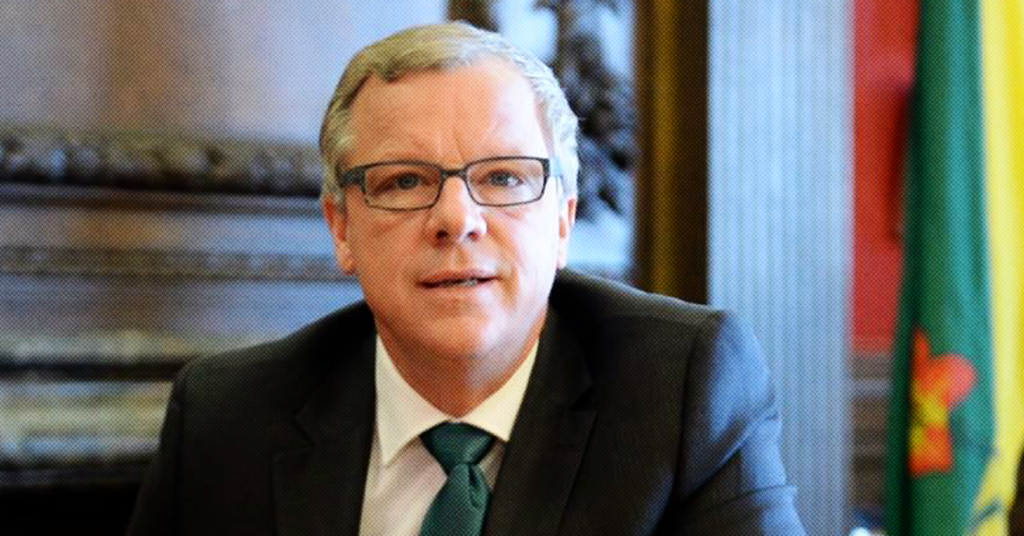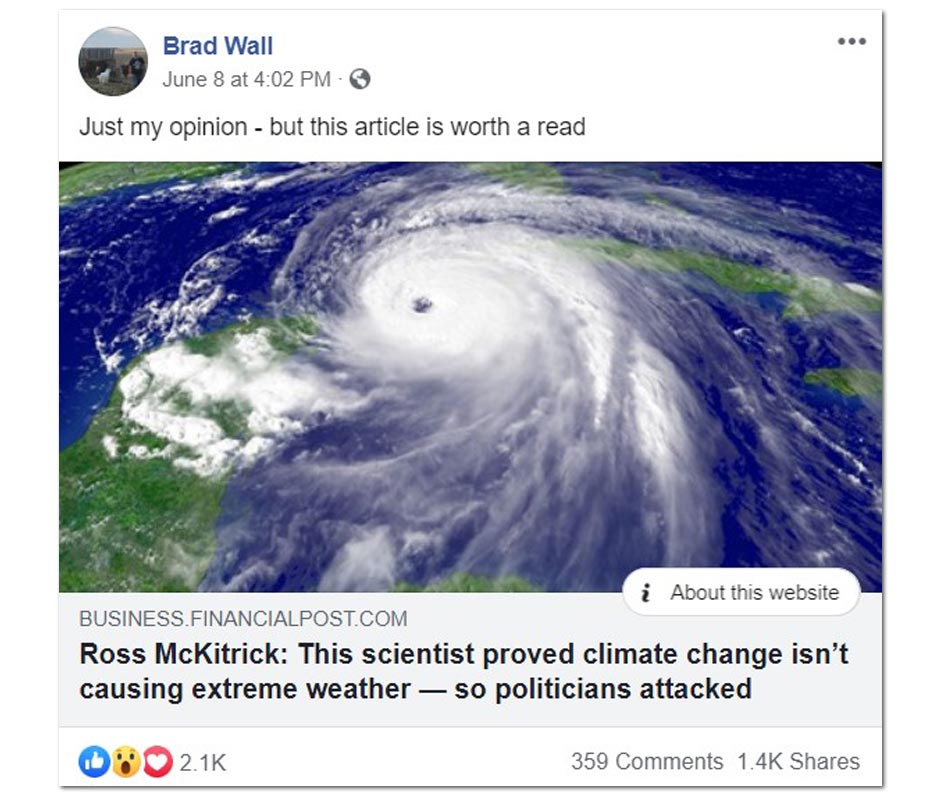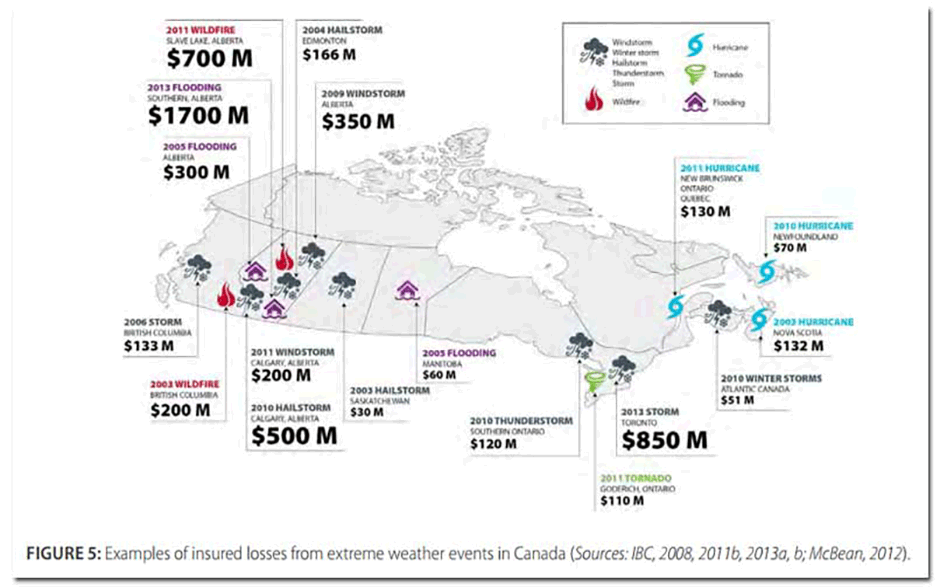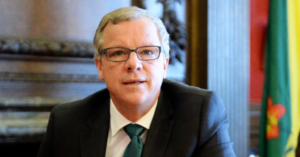
Brad Wall Promotes Article Denying Basic Facts About Climate Change Science
Former Saskatchewan Premier Brad Wall continues to be perplexed by climate science
Since stepping down as Saskatchewan Premier, Brad Wall has been busy fundraising right-wing political action committees like the Buffalo Project, stoking western separatism and posting a lot on Facebook.
In fact, just last week he shared a controversial article by Fraser Institute fellow Ross McKitrick that falsely claims there is no link between climate change and extreme weather, such as the wildfires that have damaged communities and caused mass evacuations in recent years.

In the article, McKitrick, who was a signatory of an “evangelical declaration” that proclaims climate change is part of “God’s intelligent design,” denies carbon dioxide is a pollutant and argues carbon taxes violate Biblical law, also quotes American climate change denialist Roger Pielke Jr.
Despite this, even the former Harper government acknowledged the science linking climate change and extreme weather.
Nearly 200 of the world’s countries, 97 per cent of the world’s scientists, and most Canadians are on the the same page when it comes to the biggest threat facing the planet.
But, this appears to be a bit of a pattern for Wall. Here’s a round-up.
1. “Misguided Dogma”
In his May 2016 throne speech, Wall made reference to “to “some in this country who, given the opportunity, would shut down major parts of Saskatchewan’s economy and put thousands of hard-working Saskatchewan people out of work, all in the name of some misguided dogma that has no basis in reality.”
That led to some environmentalists to clarify what “misguided dogma” he was talking about.
2. Wall went to the Paris climate conference and complained about it
While attending the United Nations climate conference in Paris, Wall was the dissenting voice on the issue among the Canadian delegation.
He may have misunderstood the purpose of the summit when he complained to reporters there was “A lot of talk about the environment, but not a lot of talk about the economy right now.”
3. Wall championed coal right to the end
About 85 per cent of Saskatchewan’s power comes from fossil fuels. According to the National Energy Board, a staggering 49 per cent is generated by coal. Coal is by far the worst form of power for generating greenhouse gasses –causing deaths and emergency room visits –, and other jurisdictions including Alberta have begun to phase it out.
But instead of following the lead of other jurisdictions and phasing it out, Wall placed his faith in carbon capture technology. It hasn’t worked, and the resulting boondoggle continues to this day.
“Imagine what we could achieve as Canadians if we were to focus, in a laser-like way, on technological solutions, rather than what I think has been a marked focus on the policy and the politics of the environment?” (block quote)
4. Wall doesn’t seem to realize climate change is expensive
Facing more frequent floods and wildfires, Wall has never seemed to take note of the costs associated with responding to climate disaster.
In Saskatchewan the government oversaw the largest evacuation in its history when it sheltered thousands from the La Ronge area fleeing the 2015 blaze.
Wall’s own finance minister blamed the fire for the government’s deficit that year. The cost of fighting the blaze exceeded $100 million dollars, more than double the province’s firefighting budget, which the opposition alleged he’d cut in half over the years since taking power.
By 2017 the budget to increased to $79 million, with Wall opting to rely on Federal and military assistance to combat future disasters.
A 2014 report from Natural Resources Canada on climate change — published while Stephen Harper was still Prime Minister — says that fires will become more frequent in the coming decades, and warns of increasing costs for disaster management.

Source: Natural Resources Canada
Similarily a TD Bank report estimated the cost of climate disaster to the Canadian economy to reach $5 billion/year next year. The same report says it will reach between $21-43 billion by 2050.
Climate disasters have hit Saksatchewan’s neighboring provinces Canada hard. In Alberta Wildfires devastated Fort McMurray, Slave Lake, and most recently the High Level evacuation. Floods devastated Calgary and High River, all in just ten years. That all costs billions.
Then of course there’s the toonie-sized hail storms to consider, also expected to become more frequent.
Our journalism is powered by readers like you.
We’re an award-winning non-profit news organization that covers topics like social and economic inequality, big business and labour, and right-wing extremism.
Help us build so we can bring to light stories that don’t get the attention they deserve from Canada’s big corporate media outlets.
Donate



